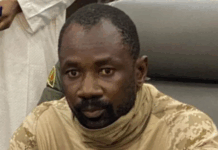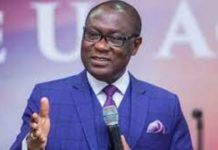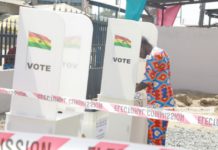
The National Peace Council says it is concerned about the spate of coup d’états in the West African sub-region.
Reverend Dr Ernest Adu-Gyamfi, Chairman of the National Peace Council, said the Council was, especially, worried about “reckless pronouncements” by some persons in the country in the wake of the military takeovers.
“A coup is something we don’t wish for ourselves. This is the only country we have, and we must do the best we can to protect our nation and our democracy,” he stressed.
The Chairman recounted past military juntas from 1966 and the excesses and said: “We wish they won’t ever happen again in our country.”
Dr Adu-Gyamfi, speaking in an interview with the Ghana News Agency on the sidelines of a management and staff retreat of the National Peace Council on Thursday, therefore, called on Ghanaians to be measured in their commentaries and actions, especially, around this time.
Public comments of a possible coup in Ghana, he noted, had the tendency of affecting the peace and security of the country.
Burkina Faso, on January 24, became the third member of the 15-nation Economic Community of West African States (ECOWAS) to be overtaken by the military.
A coup in Mali in September 2020 was followed by a second in May 2021, and in Guinea, where elected President Alpha Conde was deposed last September.
The National Peace Council Chairman, thus, appealed to the media and politicians to desist from making distasteful remarks and work towards a more peaceful country.
He asked the media to ensure that their platforms were not used to incite people to carry out acts that could disturb the peace of the country.
“Some of these pockets of agitations enable other people to take advantage of the situation, and because there is unrest in these countries, people think it is the right time to strike or take advantage of the situation because of their unhappiness,” he said.
Mr Ambrose Dery, Minister of Interior, said the existence of pervasive ethnic and chieftaincy conflicts in Northern Ghana, intra-religious clashes, inadequate capacity of institutions and communities made the teeming unemployed youth vulnerable to radicalism and violent extremism.
He said external threats to the country’s peace and security largely emanated from West Africa and the Sahel, including the spillovers from violent extremism, terrorism, acquisition and transborder smuggling of illegal and light weapons, drug trafficking and crimes relating to trafficking.
Ghana, he noted, faced a potential threat of recruitment and radicalization, particularly of the youth, as the threat of violent extremism descended towards the coastal states from the Sahel, with an increase in attacks in Burkina Faso, Mali and Niger.
The Interior Minister said the country’s strong interaction with and proximity to Burkina Faso, Nigeria, Mali and Niger – all theatres for terrorist violence – had in the last four years provoked predictions and fears that the country could be the next frontier targeted for such radicalization and attacks in the West Africa Sub-Region.
Meanwhile, President Nana Addo Dankwa Akufo-Addo, Chairman of ECOWAS, at the opening of an extraordinary summit by leaders of the regional body in Accra, urged collective and decisive action to subdue the resurgence of political instability in West Africa.
He further urged the subregional bloc to ensure the protection of democracy in the region and find a sustainable solution to the resurgence of the canker of military coups.






